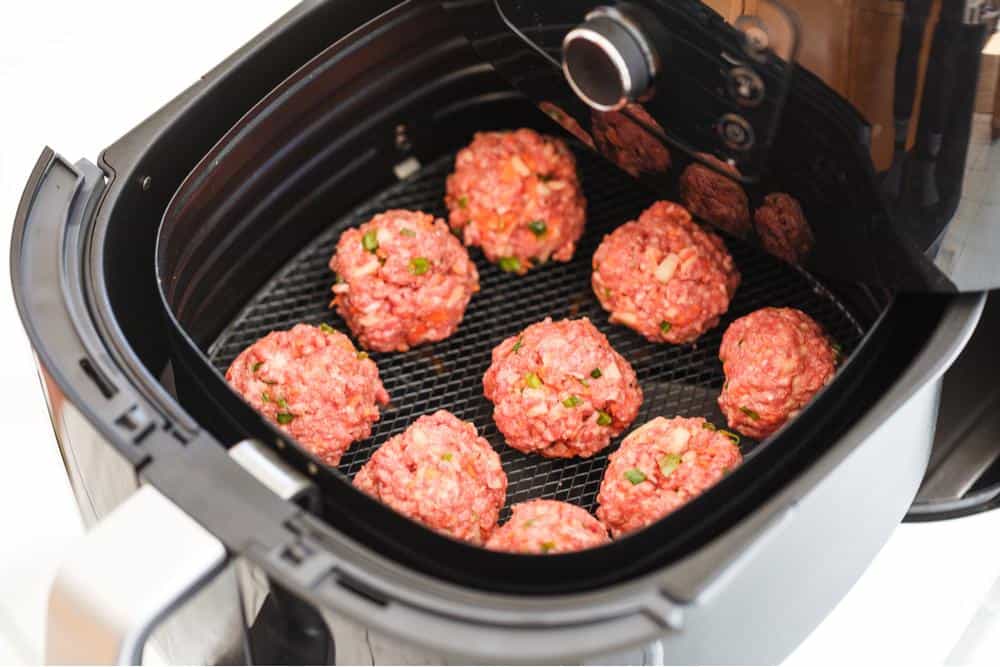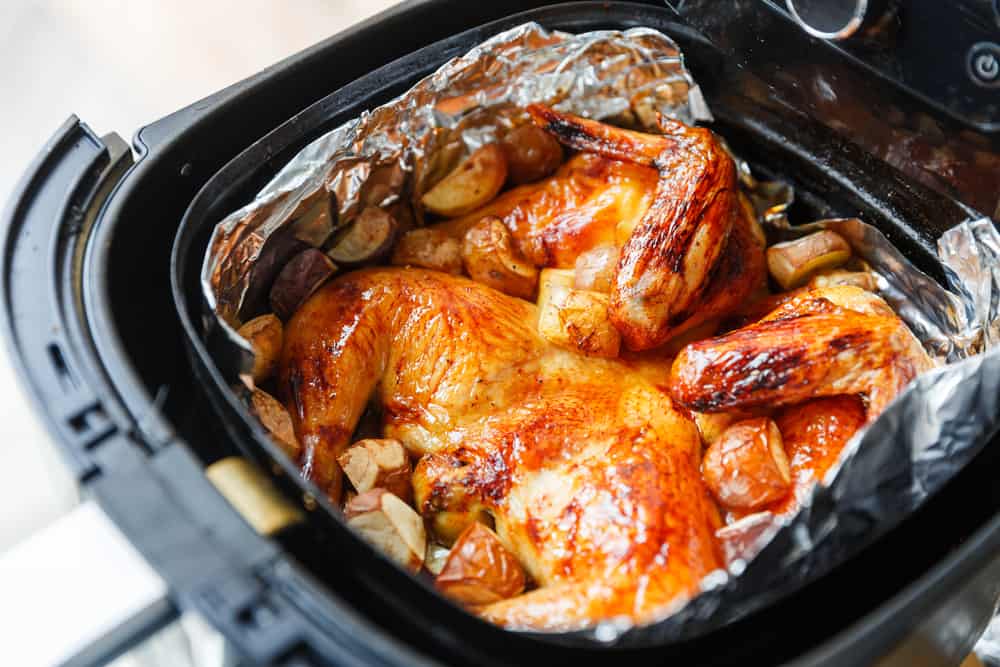When summer approaches, people are getting ready to fire up the grill and cook outdoors. Its time to enjoy those delicious air fryer recipes - including french fries, chicken wings and fried chicken. The great thing is that cooking food with an air fyer is much healthier than deep frying. The convection cooking method is able to effectively make "fried food" by circulating hot air instead of drenching your food in cooking oil. You still get tasty, crispy food without the extra fat and calories.
But one of the big questions many people have is whether or not they can use their air fryer alongside their barbeque outdoors.
Many air fryers have a warning label that says not to use them outdoors, but there are air fryers that are specifically made to use outside. This is a nuanced topic! As long as you follow safety protocols, there’s no reason you can’t have a wonderful experience using your air fryer outside with the family.

It may be possible to use an air fryer for your cookout
Below, we’ll address the following:
Using an air fryer outdoors is dangerous enough that most air fryers come with a warning in the enclosed documentation cautioning users against using them outdoors. This is because safety is complex, and most people don’t have the patience to follow every step necessary to be safe while air frying outside.
Remember that it's easy and less risky to fry your food indoors and take it to the people waiting outside if you’re going to grill or barbeque. After all, most of the time, the grilled food is cooked only a few feet away from the house to begin with. It may be wiser to just do this if you can.
In some cases the food may have to be cooked farther away. You might have reasons that you can’t cook in your kitchen at a specific time, or you might be cooking something that the rest of the family is not on board with the smell of. These are perfectly valid reasons for wanting to cook outside with your air fryer.
Before you learn how to use your air fryer outside, you need to know how to use your air fryer indoors as intended. As with any appliance, there are rules to be observed. Most of them will be named in the owner’s manual for a more in-depth look, but in short, every rule you should observe with your air fryer indoors also applies outdoors.
Air fryers may continue to use electricity even when turned off. They reach dangerously high temperatures when they cook food. The ventilation system can easily become a fire hazard if the fryer isn’t placed securely. Even indoors, you have to be mindful of how you're using your air fryer.
First of all, take the time to read all of the instruction materials that came with your air fryer! The manual will likely have things in it specific to your air fryer, required for using it safely and to ensure it works properly. Many of these things are not only to prevent fires, but to vastly improve the quality of the food you're making.
Manuals tend to be good for generally understanding the safety protocols for air fryers, and will let you know if your air fryer is one of those made with outdoor use in mind or not. If not, it can still be done.
However, it is recommended that you do not use it outside in most cases because it is extremely challenging to do so safely. There are several working parts to ensure no one ends up burned and there isn’t a fire.
Air fryers cook quickly because of their capacity for extremely high temperatures. Yours is likely to heat from anywhere between 350 and 400 degrees. Temperatures that high can easily cause a fire if exposed to dry grass and severe burns if exposed to skin.
You will want to be sure to put your air fryer on a non-flammable surface, such as stone. Never place it on a surface that is meant to get hot, like the wires of your grill. Put it somewhere that it will be clear of children and pets and even the less cautious adults in your life.
More than this, be careful which direction the vent is facing. Nothing that might catch fire should be placed near the vent as this area of the air fryer will get very hot while you are using it.
Nothing including aerosol or propellants. Make sure to check your sprays to make sure they are natural! Coconut oil, avocado oil, and olive oil are excellent choices.
This is not for health reasons, at least not in the way most might think. Chemically laced cooking sprays have a higher chance of igniting than more organic ones, not to mention natural oils simply smell better when they’re cooking.
Another thing to note is that aerosol sprays can cause the basket of your air fryer to chip. They don’t mix well with the coating of the baskets on most air fryers, which is a problem because that coating helps with temperature regulation.
A propellant is an ingredient in an aerosol that helps expel the chemical spray. If you’ve ever seen a video of someone spraying something through a lighter flame and making a makeshift flamethrower, you understand why this is a bad idea. It’s fine in a convection oven because there’s more space, but an air fryer is compressed. There isn’t as much room for the air and heat to escape.
Every time you finish using your air fryer, you should unplug it. Some appliances function best when left plugged in, but the air fryer isn’t one of them. The air fryer constantly consumes energy even when it’s deactivated. By unplugging it, you use less electricity and keep your bill down.
Leaving your air fryer plugged in is also a fire risk. Unplugging any appliance reduces the risk of fires. However, not all appliances continue to draw power even when shut down the way air fryers do. This makes an air fryer more of a fire risk than other appliances typically are.
Another thing to note is that when you place your air fryer, you should be careful of where the vent is stationed and not allow it to blow directly onto the outlet where the air fryer is plugged in. You don’t want to overheat as the plug is giving off heat of its own, and additional heat will increase the fire risk.
That is doubly true if you are using your air fryer outdoors! Being in a well-ventilated area does not entirely mitigate the risk of a fire sparking, and in fact, there are many more things outdoors that can catch than there are on your kitchen counter, so be mindful of where you have put things!
Although it is possible to reduce the risk of accidents outside, there is a good reason most air fryers say only to use them indoors. Consider how worth the risk taking your air fryer outside is to you when the option of just cooking the food inside and bringing it out exists.

You can cook meatballs - and even hamburgers in many air fryers
Of course, if you are cooking far enough away from the house, the appeal of taking the air fryer with you exists, and it will be much easier not to have to walk across the entire yard. However, it might still be worth it if you don’t have an area safe enough.
There are many reasons you might opt to take your air fryer outside anyway, but it is at least worth thinking twice because of how much more dangerous air frying outside is than inside.
So, you’ve gone over all of the indoor instructions and thought about the logistics. Maybe your cookout is located on the other side of a big yard, or maybe there’s a reason you can’t cook in the kitchen.
Regardless of your reasoning, you have deemed you want to use your air fryer outside. What next?
It came up earlier that some air fryers were made to be used outside (such as this one). Only attempt to use your air fyrer outside if it is meant for that purpose.
Here is a sample italic youtube link
Even if you do have an air fryer that was made to be used outdoors, it is still wise to look at all of the safety precautions that should be taken. An air fryer is still an air fryer, and regardless of what the manufacturer has done to take care, your own safety is also paramount.
First, you want to consider how heavy your air fryer is. You are going to have to both carry it outside and back in. You will also have to find a suitable place to put it. As a result, the smaller and lighter the air fryer you’re working with, the easier it will be for you to properly use it outdoors.
A larger air fryer will be heavy, take longer to cool down once you’ve used it, and it will be less likely to sit in a safe place for the air fryer to be used. It’s also worth considering how much heat a larger air fryer is going to give off compared to a smaller one, increasing the risk of using it outdoors.
Air fryers expell a lot of heat, so it is ill-advised to use your air fryer out in the open. When positioned in direct sunlight, this is compounded, so it is imperative to first find a source of shade. Place it where the shade already exists, or set something up specifically to keep it shaded.
One option is to use your patio if it already has an awning over it, but if you don’t have one, any sort of constructed shelter will do. You may also consider setting up a tent with plenty of clearance to keep the sun off of your air fryer as you work with it. For larger events, there is likely to be a cooking tent or gazebo set up in the area anyway.

Chicken wrapped in foil in an air fyer is similar to cooking chicken on the grill
Once you have a shady place to use your air fryer, you should make sure you have a heat-resistant surface to place it on. Most countertops have this property, but you can also use stone. Make sure whatever surface you place your air fryer on isn’t on the ground where children or animals can reach it.
Be careful with things like plastic folding tables because many of these will melt when exposed to high temperatures. The bottom of some air fryers gets incredibly hot, and no one wants to deal with melted plastic. Some plastics exude dangerous chemicals when melted. You don’t want to be breathing that in at your backyard barbecue!
When you're working outside, this step is particularly imperative! Outdoor cords and outlets have been exposed to the weather. As a result, they are far more likely to have frayed and have exposed wires. Exposed wires are a fire hazard and a shock hazard, and this is one of the many ways in which it is more dangerous to use your air fryer outdoors.
Carefully check all of the electrical pieces you need to make the air fryer run and make sure none of them have been worn through. If there are holes in any of your wires or the outlet shows signs of disrepair, it is best not to try this until repairs have been made.
Signs of damage to the cord include frayed parts where wires have been exposed and bends and kinks in the wire that don’t easily come undone. If there are any sparks when you plug your air fryer in, you should make sure everything is off and check your wires before trying again to be safe.
If you have any doubts about the condition of the outlets or cords, don’t take the risk. It’s far better to find another option than to end up with injuries.
Is it safer to use an air fryer outdoors when it’s cold? Technically, no. All of the same issues apply even when it isn't warm outside, except you have to take extra care to keep everything dry if there is snow on the ground. As long as you take all of the precautions, an air fryer gets hot enough to work even in winter weather.
Using your air fryer outdoors in the winter might even be a little safer, as long as you’re sure nothing is getting wet, because there is less risk of overheating. However, air fryers are not waterproof.
Like with any appliance, you want to avoid getting your air fryer wet. Water is an excellent electrical conductor. And, unfortunately, so is your body. If your hands are in any way wet or the appliance comes into contact with something that is, there is a risk of electric shock.
If you’re going to use your air fryer outside in the winter, you need to be absolutely sure you’re placing it somewhere dry where there is no risk of it getting wet. Just like in the heat, having a shelter for the fryer is the safest option to ensure no snow, sleet, rain, or other weather hazards come into play.
